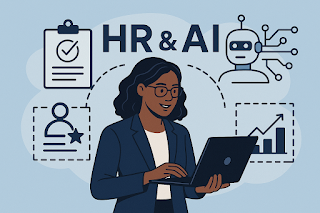How AI will help to bring the 'Human' element back to HR
In today's world, where technology is rapidly evolving, artificial intelligence (AI) has become an essential part of many industries. The human resources (HR) sector is no exception. AI has the potential to transform the way HR functions, allowing it to bring the 'human' element back to its processes.
One of the significant challenges faced by the HR sector is managing large amounts of data. HR professionals have to sift through piles of resumes, applications, and performance reports, which can be a time-consuming and tedious process. AI can automate these tasks, making them faster and more efficient, freeing up HR professionals' time to focus on more valuable tasks such as employee engagement and development. According to a study by KPMG, using AI in HR processes can reduce the time spent on administrative tasks by up to 40%, allowing HR professionals to focus on more strategic activities.
AI can also help to reduce biases in the HR sector. Often, unintentional biases occur in the recruitment and hiring process. AI can eliminate these biases by objectively analyzing resumes and applications, based on a set of predetermined criteria. This can help ensure that candidates are evaluated based on their qualifications and skills, rather than on factors such as age, gender, or ethnicity. According to a report by Deloitte, using AI in the recruitment process can help reduce bias and increase diversity.
Moreover, AI can improve the employee experience. It can personalize training and development plans for employees, taking into account their strengths and weaknesses, job performance, and learning style. This can help employees feel more valued and engaged, leading to increased job satisfaction and productivity. According to a study by Accenture, companies that use AI to personalize employee experiences can achieve a 6% increase in employee satisfaction and a 5% increase in employee productivity.
Another way AI can bring the 'human' element back to HR is by enhancing employee communication. AI-powered chatbots can provide 24/7 support to employees, answering their questions and providing guidance. This can help employees feel more connected to their workplace, leading to improved employee retention rates. According to a survey by Oracle, 80% of HR leaders believe that AI-powered chatbots can improve employee experiences.
Finally, AI can help HR professionals make better decisions. By analyzing large amounts of data, AI can provide insights that can help HR professionals make informed decisions on issues such as recruitment, employee development, and retention. According to a report by PwC, using AI in HR can help identify key workforce trends, improve decision-making, and increase the ROI of HR initiatives.
In conclusion, AI has the potential to transform the HR sector, bringing the 'human' element back to its processes. By automating routine tasks, eliminating biases, improving the employee experience, enhancing communication, and providing valuable insights, AI can free up HR professionals to focus on the essential aspects of their work - building and maintaining relationships with employees. While AI will never replace the human element in HR, it can complement it, making the sector more efficient and effective.




Comments
Post a Comment